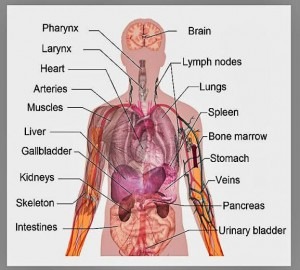Can Stress Cause Cancer? Part 3
July 5, 2014 | Author: Susan Silberstein PhD
Stress and cancer are connected via every organ system. In previous blogs, I talked about the effect of stress on immunity, nervous system function,hormone balance, and digestion, and how those changes can lead to cancer. Besides these four major ways that link stress and cancer , there are six other ways that cancer and stress are connected: Stress can also negatively affect the body’s eliminatory, respiratory, circulatory and lymphatic systems, damage cellular DNA, and disturb acid-alkaline balance. And all ten of these aspects of body chemistry are interconnected and interdependent and relevant to cancer protection.
Elimination – The body has several eliminatory organs, including the liver, kidneys, and colon. The liver is a major player in our detoxification processes, breaking down and deactivating harmful substances, and neutralizing hormones and carcinogens that promote cancer. The kidneys filter our blood of water-soluble toxic substances and prepare them for elimination. The colon excretes solid wastes and toxins through the feces.
Stress can impair all of these eliminatory functions. Stress impedes blood flow to the liver and increases inflammatory processes that cause liver damage. Without a healthy liver, we are at higher risk for cancer. Oxidative stress (an overabundance of free radicals often generated by stress) also produces inflammation that plays a role in kidney disease and renal failure. Feeling “pissed off,” especially over a long period, could literally contribute to poor kidney function and potential kidney cancer or bladder cancer. Similarly, feeling “up tight” can lead to constipation—a risk factor for colon cancer, breast cancer, and prostate cancer.
Respiration – Have you ever noticed that when you are under stress you sometimes find yourself holding your breath? Emotional stress can induce irregular or shallow breathing and impair deep diaphragmatic breathing. This, in turn, can potentially lower oxygen levels at the cellular level, producing an environment that favors the growth of cancers cells. Malignant cells function with an anaerobic metabolism and cannot survive in the presence of high levels of oxygen, according to Nobel Prize-winning biochemist Dr. Otto Warburg: “Deprive a cell 35% of its oxygen for 48 hours and it may become cancerous.”
Circulation – Chronic stress also impairs the body’s circulatory system. The effect of stress in terms of restricted blood flow to the heart is well known, and we just mentioned impaired blood flow to the liver. There is another connection to cancer. With poor circulation, the nutrients and oxygen that help fight disease cannot get into our cells, and environmental toxins and cellular wastes can’t get out. That’s a cancer waiting to happen! In addition, stress specifically impedes circulation of white blood cells that support immunity. According to the Journal of Immunology (1995), “One of the most underappreciated effects of stress on the immune system is its ability to induce significant changes in leukocyte distribution in the body….Chronic stress suppresses or dysregulates innate and adaptive immune responses through mechanisms that involve suppression of leukocyte numbers, trafficking, and function.”
In my next blog on stress and cancer, I will discuss the final three mechanisms by which stress can contribute to cancer.
Join the conversation: Ask Holistic Cancer Coach Facebook Group
References:
[1] http://ndt.oxfordjournals.org/content/16/11/2135.full – Galle J. Oxidative stress in chronic renal failure Nephrol. Dial. Transplant. (2001) 16
(11): 2135-2137
[2] Dhabhar FS, Miller AH, McEwen BS, Spencer RL. Effects of stress on immune cell distribution—dynamics and hormonal mechanisms.J Immunol 1995;154:5511–27.
[3] https://sites.google.com/site/ganodermareview/the-root-cause-of-cancer
